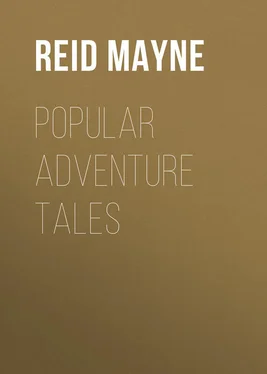Mayne Reid - Popular Adventure Tales
Здесь есть возможность читать онлайн «Mayne Reid - Popular Adventure Tales» — ознакомительный отрывок электронной книги совершенно бесплатно, а после прочтения отрывка купить полную версию. В некоторых случаях можно слушать аудио, скачать через торрент в формате fb2 и присутствует краткое содержание. Жанр: literature_19, foreign_antique, foreign_prose, foreign_children, на английском языке. Описание произведения, (предисловие) а так же отзывы посетителей доступны на портале библиотеки ЛибКат.
- Название:Popular Adventure Tales
- Автор:
- Жанр:
- Год:неизвестен
- ISBN:нет данных
- Рейтинг книги:3 / 5. Голосов: 1
-
Избранное:Добавить в избранное
- Отзывы:
-
Ваша оценка:
- 60
- 1
- 2
- 3
- 4
- 5
Popular Adventure Tales: краткое содержание, описание и аннотация
Предлагаем к чтению аннотацию, описание, краткое содержание или предисловие (зависит от того, что написал сам автор книги «Popular Adventure Tales»). Если вы не нашли необходимую информацию о книге — напишите в комментариях, мы постараемся отыскать её.
Popular Adventure Tales — читать онлайн ознакомительный отрывок
Ниже представлен текст книги, разбитый по страницам. Система сохранения места последней прочитанной страницы, позволяет с удобством читать онлайн бесплатно книгу «Popular Adventure Tales», без необходимости каждый раз заново искать на чём Вы остановились. Поставьте закладку, и сможете в любой момент перейти на страницу, на которой закончили чтение.
Интервал:
Закладка:
This dark object was no other than the poll of a human being; and the river shallowing towards the bank, it rose higher and higher above the water, until the boys could distinguish the glistening neck and naked shoulders of a red and brawny Indian! All was now explained. The Indian had been duck-hunting, and had used the stuffed skin of the swan as his disguise; and hence the puzzling motions of the bird. He had not noticed the canoe – concealed as it was – until the loud crack of François' gun had startled him from his work.
This, and the heads and white faces of the boys peeping over the bushes, had frightened him, even more than he had them. Perhaps they were the first white faces he had ever seen. But, whether or not, sadly frightened he was; for, on reaching the bank, he did not stop, but ran off into the woods, howling and yelling as if Old Nick had been after him: and no doubt he believed that such was the case.
The travellers picked up the swan-skin put of curiosity; and, in addition to the ducks which François had killed, they found nearly a score of these birds, which the Indian had dropped in his fright, and that had afterwards risen to the surface. These were strung together, and all had their necks broken.
After getting them aboard, the canoe was cleared of the bushes; and the paddles being once more called into service, the little craft shot down stream like an arrow.
CHAPTER XIX.
THE SHRIKE AND THE HUMMING-BIRDS
The picturesque scenery of the Elk appeared to be a favourite resort with the feathered creation. Here our voyageurs saw many kinds of birds; both those that migrate into the fur countries during summer, and those that make their home there in the cold, dark days of winter. Among the former were observed – the beautiful blue bird of Wilson which, on account of its gentle and innocent habits, is quite as much esteemed in America as the “robin” in England.
Another favourite of the farmer and the homestead, the purple martin, was seen gracefully wheeling through the air; while, among the green leaves, fluttered many brilliant birds. The “cardinal grosbeak” with his bright scarlet wings; the blue jay, noisy and chattering; the rarer “crossbill” with its deep crimson colour; and many others, equally bright and beautiful, enlivened the woods, either with their voice or their gaudy plumage.
There was one bird, however, that had neither “fine feathers” nor an agreeable voice, but that interested our travellers more than any of the others. Its voice was unpleasant to the ear, and sounded more like the grating of a rusty hinge than anything else they could think of. The bird itself was not larger than a thrush, of a light grey colour above, white underneath, and with blackish wings. Its bill resembled that of the hawks, but its legs were more like those of the woodpecker tribe; and it seemed, in fact, to be a cross between the two. It was neither the colour of the bird, nor its form, nor yet its song, that interested our travellers, but its singular habits; and these they had a fine opportunity of observing at one of their “noon camps,” where they had halted to rest and refresh themselves during the hot mid-day hours. The place was on one of the little islets, which was covered with underwood, with here and there some larger trees. The underwood bushes were of various sorts; but close to the spot where they had landed was a large thicket of honeysuckle, whose flowers were in full bloom, and filled the air with their sweet perfume.
While seated near these, François' quick eye detected the presence of some very small birds moving among the blossoms. They were at once pronounced to be humming-birds, and of that species known as the “ruby-throats” so called, because a flake of a beautiful vinous colour under the throat of the males exhibits, in the sun, all the glancing glories of the ruby. The back, or upper parts, are of a gilded green colour; and the little creature is the smallest bird that migrates into the fur countries, with one exception, and that is a bird of the same genus – the “cinnamon humming-bird.” The latter, however, has been seen in the Northern regions, only on the western side of the Rocky Mountains; but then it has been observed even as far north as the bleak and inhospitable shores of Nootka Sound. Mexico, and the tropical countries of America, are the favourite home of the humming-birds; and it was, for a long time, supposed that the “ruby-throats” were the only ones that migrated farther north than the territory of Mexico itself. It is now known, that besides the “cinnamon humming-bird,” two or three other species annually make an excursion into higher latitudes.
The “ruby-throats” not only travel into the fur countries, but breed in numbers upon the Elk River, the very place where our travellers now observed them.
As they sat watching these little creatures, for there were several of them skipping about and poising themselves opposite the flowers, the attention of all was attracted to the movements of a far different sort of bird. It was that one we have been speaking of. It was seated upon a tree, not far from the honeysuckles; but every now and then it would spring from its perch, dash forward, and after whirring about for some moments among the humming-birds fly back to the same tree.
At first the boys watched these manœuvres without having their curiosity excited. It was no new thing to see birds acting in this manner. The jays, and many other birds of the fly-catching kind have this habit, and nothing was thought of it at the moment. Lucien, however, who had watched the bird more narrowly, presently declared to the rest that it was catching the humming-birds, and preying upon them – that each time it made a dash among the honeysuckles, it carried off one in its claws, the smallness of the victim having prevented them at first from noticing this fact. They all now watched it more closely than before, and were soon satisfied of the truth of Lucien's assertion, as they saw it seize one of the ruby-throats in the very act of entering the corolla of a flower.
This excited the indignation of François, who immediately took up his “double-barrel,” and proceeded towards the tree where the bird, as before, had carried this last victim. The tree was a low one, of the locust or pseud-acacia family, and covered all over with great thorny spikes, like all trees of that tribe. François paid no attention to this; but, keeping under shelter of the underwood, he crept forward until within shot. Then raising his gun, he took aim, and pulling trigger, brought the bird fluttering down through the branches. He stepped forward and picked it up – not that he cared for such unworthy game, but Lucien had called to him to do so, as the naturalist wished to make an examination of the creature.
He was about turning to go back to camp, when he chanced to glance his eye up into the locust-tree. There it was riveted by a sight which caused him to cry out with astonishment. His cry brought the rest running up to the spot, and they were not less astonished than he, when they saw the cause of it. I have said that the branches of the tree were covered with long thorny spikes that pointed in every direction; but one branch in particular occupied their attention. Upon this there was about a dozen of these spikes pointing upward, and upon each spike was impaled a ruby-throat !
The little creatures were dead, of course, but they were neither torn nor even much ruffled in their plumage. They were all placed back upwards, and as neatly spitted upon the thorns as if they had been put there by human hands. On looking more closely it was discovered that other creatures as well as the humming-birds, had been served in a similar manner. Several grasshoppers, spiders, and some coleopterous insects were found, and upon another branch two small meadow-mice had been treated to the same terrible death.
Читать дальшеИнтервал:
Закладка:
Похожие книги на «Popular Adventure Tales»
Представляем Вашему вниманию похожие книги на «Popular Adventure Tales» списком для выбора. Мы отобрали схожую по названию и смыслу литературу в надежде предоставить читателям больше вариантов отыскать новые, интересные, ещё непрочитанные произведения.
Обсуждение, отзывы о книге «Popular Adventure Tales» и просто собственные мнения читателей. Оставьте ваши комментарии, напишите, что Вы думаете о произведении, его смысле или главных героях. Укажите что конкретно понравилось, а что нет, и почему Вы так считаете.












